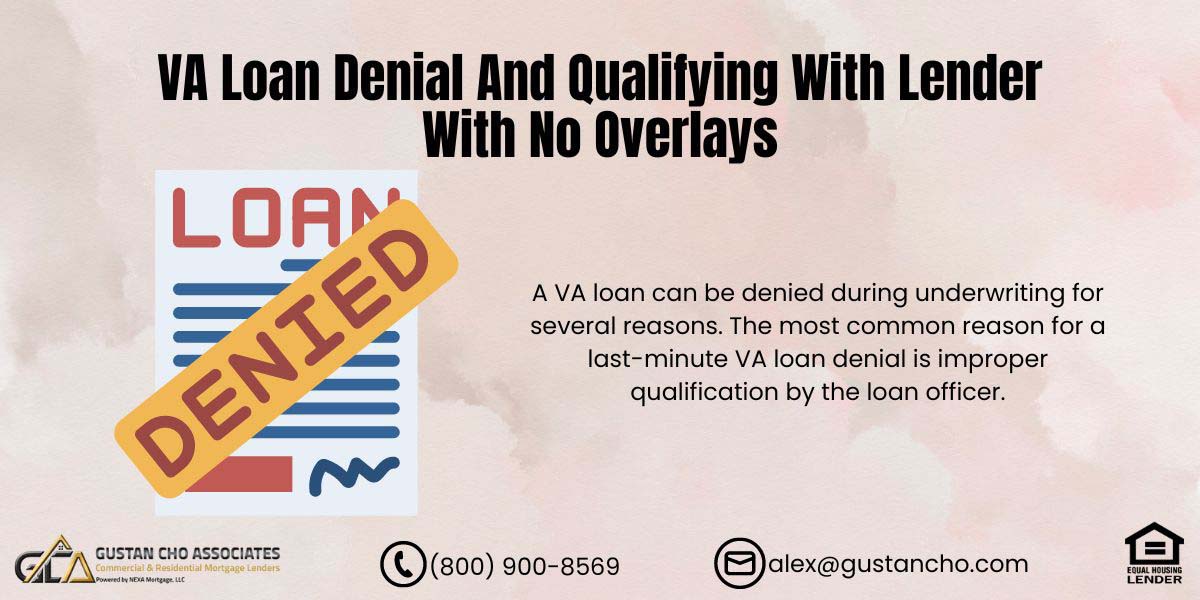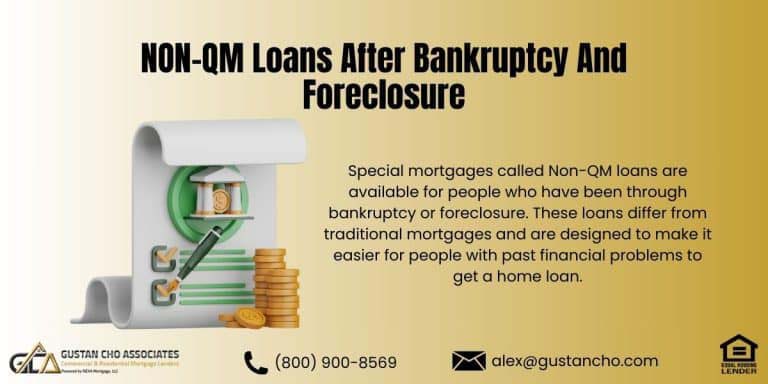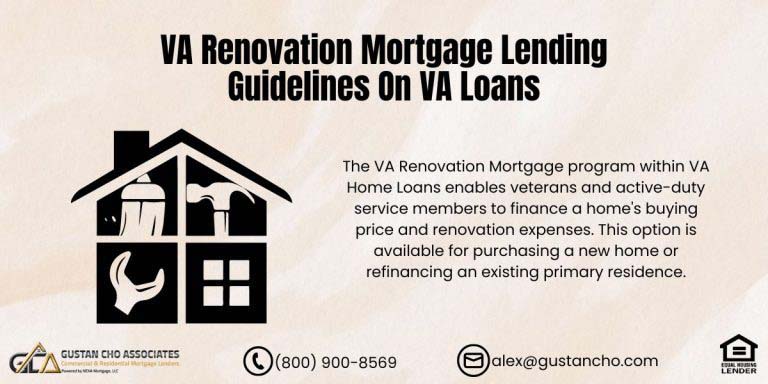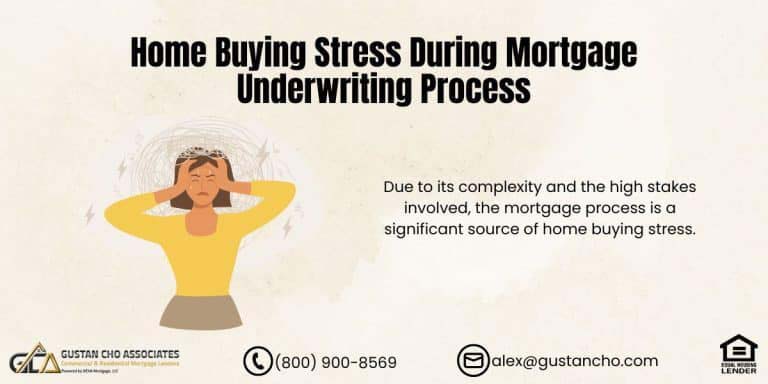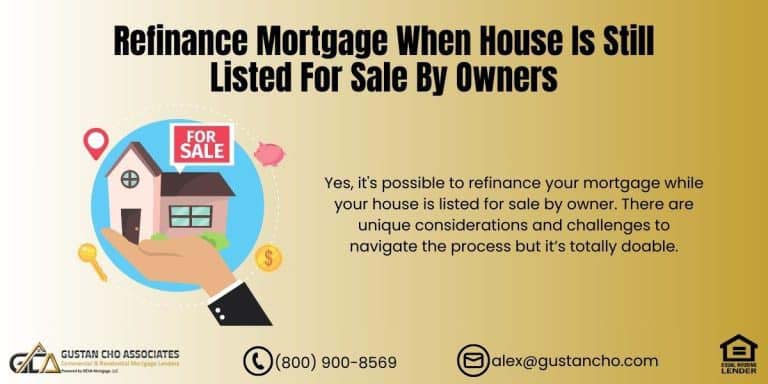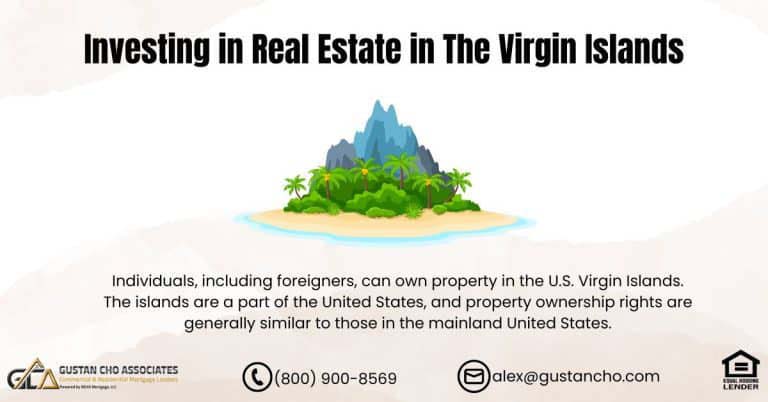This Article Is About VA Loan Denial And Getting Qualified With Lender With No Overlays
There should be no reason why anyone should get a VA Loan Denial. Unfortunately, there are many borrowers who either get a last-minute mortgage loan denial or major stress during the mortgage process. There is one reason and one reason ONLY for a last-minute VA Loan Denial or stress during the VA mortgage process. The loan officer did not properly qualify the Veteran for the VA Loan. Last-minute VA Loan Denial is not the borrower’s fault. Borrowers go to the loan officer because he or she depends on the expertise of the loan officer and Lender. The pre-approval stage of the mortgage process is the most important step in the overall mortgage underwriting process.
In this article, we will discuss and cover choosing a lender with no overlays in the event you get denied for a VA loan.
Reasons For VA Loan Denial
A VA loan denial in 2024 occurs when an applicant for VA home loans—including veterans, active-duty service members, or eligible surviving spouses—does not receive approval for their loan application. Several common factors can lead to a VA loan denial, including:
Credit Score
While VA home loans have more flexible credit requirements than conventional loans, lenders still enforce minimum credit score standards. A VA Loan Denial may occur if the applicant’s credit score falls below the required threshold.
Debt-to-Income Ratio (DTI)
Lenders assess the applicant’s ability to manage monthly payments relative to their income. A high DTI ratio, indicating significant debt compared to income, can lead to a VA loan denial.
Insufficient Income
Applicants must demonstrate stable and adequate income to repay the mortgage. Insufficient or unstable income can result in a VA loan denial.
Employment History
A consistent employment history is crucial for VA home loans. Frequent job changes or gaps in employment may raise concerns, leading to a VA loan denial.
Property Appraisal
The property must meet the VA’s Minimum Property Requirements (MPRs). A VA loan denial can occur if the property does not meet these standards or appraises for less than the loan amount.
Incomplete Documentation
Presenting only some essential paperwork, such as evidence of income, employment, and other financial details, may lead to VA loan denial.
Bankruptcy or Foreclosure History
Recent bankruptcy or foreclosure can affect eligibility. The VA has guidelines on waiting periods after such events, but individual lenders may have stricter criteria, potentially leading to a VA loan denial.
Eligibility Issues
Applicants must meet specific service requirements to qualify for VA home loans. Issues with the applicant’s eligibility certificate can lead to a VA loan denial.
If a VA loan denial occurs, applicants can take steps to address the reasons for denial, such as improving their credit score, reducing debt, or providing additional documentation. Consulting with a VA loan specialist can help applicants understand the reasons for denial and explore other mortgage options.
Denied for a VA Loan? You May Still Qualify with a Lender with No Overlays!
Contact us today to learn how we can help you qualify for a VA loan with no overlays and get back on track toward homeownership.
Great Benefits Of VA Home Loans
VA Loans offer the following:
- Only available to the select few. Offered only to Veterans of the United States Military who has proudly served our country and gotten an honorable discharge
- Has been awarded a valid Certificate of Eligibility also commonly referred as a COE
- No down payment required
- 100% Loan To Value
- Offers 100% financing
- No closing costs required with a sellers concessions and/or lender credit
- VA Loan Limits are $453,000
- Loan limits are higher in high-cost areas throughout the United States
- Easy streamlined process to qualify for VA Loan
- Very loose and lax guidelines
- VA does not have credit score requirements or debt to income ratio requirements
- One of the lowest mortgage rates out of all loan programs
- There is no mortgage insurance premium
Again, no Veteran should get a VA Loan Denial. We will discuss what you should do if you get a VA Loan Denial.
Why Did You Get A VA Loan Denial?
What can go wrong with a VA loan?
Several factors can contribute to issues with VA home loans, potentially leading to a VA loan denial. Here are some common problems that can arise:
- Eligibility Issues:
- Service Requirements: Applicants may need to meet the required length or type of service necessary for eligibility.
- Certificate of Eligibility (COE): Difficulty obtaining or errors in the COE can delay or prevent loan approval for VA home loans.
- Credit Score:
- Low Credit Score: Although VA home loans have lenient credit requirements, a very low credit score can still result in a VA loan denial.
- Credit History Issues: Recent bankruptcies, foreclosures, or late payments can negatively impact the application.
- Debt-to-Income Ratio (DTI):
- High DTI Ratio: Excessive debt relative to income can result in a VA loan denial or a lower approved loan amount.
- Income Stability and Verification:
- Unstable Employment: Frequent job changes or employment gaps can raise concerns.
- Insufficient Income: Inadequate or unverifiable income can prevent loan approval for VA home loans.
- Property Appraisal:
- Low Appraisal Value: If the property appraises for less than the purchase price, the loan may not be approved for the full amount.
- Property Condition: The property must meet the VA’s Minimum Property Requirements (MPRs). If it doesn’t, necessary repairs must be completed before approval.
- Incomplete or Inaccurate Documentation:
- Missing Documents: Failure to provide necessary documentation, such as proof of income or employment, can delay or prevent loan approval.
- Errors in Application: Mistakes or inconsistencies can lead to a VA loan denial.
- Title Issues:
- Title Defects: Property title problems, such as liens or unresolved legal claims, can prevent loan approval.
- Title Insurance: Lack of clear title insurance can hinder obtaining VA home loans.
- Funding Fee:
- Payment Issues: Need help paying or financing the VA funding fee, which might pose challenges. Nevertheless, this fee is usually included in the loan amount.
- Bankruptcy or Foreclosure:
- Waiting Periods: Applicants with a history of bankruptcy or foreclosure may face mandatory waiting periods before they are eligible for VA home loans.
- Changing Loan Terms:
- Interest Rate Fluctuations: Changes in interest rates during the loan process can affect affordability.
- Loan Amount Adjustments: Unexpected changes in loan amount due to appraisal issues or underwriting decisions.
To mitigate these potential issues and avoid a VA loan denial, applicants should ensure they meet eligibility requirements, maintain a stable financial profile, gather all necessary documentation, and work with experienced VA loan professionals.
Typical Lender Overlays By Mortgage Companies
Here is a typical case scenario of a VA Loan Denial:
VA does not have a minimum credit score requirements:
- Most VA Lenders have overlays on credit scores of 620 to 640 FICO
- VA does not have a debt to income ratio requirements
- Most Lenders have overlays on debt to income ratios where they can cap it at 41%
I recently had an approve/eligible per Automated Underwriting System on a VA Loan:
- Where the borrower had a 582 FICO credit score
- 58% debt to income ratio
- We are going to do this deal
- However, most VA Lenders may not do this deal
- The loan officer may think it would have been fine to submit a file with an approve/eligible per automated findings
But may not have realized of their lender overlays on VA Loans.
VA Loan Denied? Let’s Get You Qualified with a Lender with No Overlays!
Reach out now to explore your options and get the guidance you need to secure your VA loan.
What are the Chances of Getting Denied After Pre-Approval?
Even after receiving pre-approval for VA home loans, there is still a possibility of encountering a VA loan denial during the final approval process. Changes in the applicant’s financial situation, such as job loss, income reduction, or taking on new debt, can negatively impact their debt-to-income ratio, leading to a denial.
Additionally, fluctuations in the applicant’s credit score due to negative credit activity, such as late payments or increased credit utilization, can result in a VA loan denial.
Property-related issues, including appraisal problems or unresolved title disputes and incomplete or inaccurate documentation during the underwriting process, can increase the chances of a denial.
To minimize the risk of a VA loan denial after pre-approval for VA home loans, applicants should maintain a stable financial situation and avoid taking on new debt. Ensuring all documentation is accurate and complete, communicating with the lender, and promptly addressing any property or title issues are crucial. By following these guidelines, applicants can improve their chances of securing final approval and obtaining their VA home loan.
The Role And Function Of The VA
The United States Department of Veteran Affairs is not a lender:
- Department of Veterans Affairs does not originate, fund, or service VA Loans
- The U.S. Department of Veteran Affairs guarantees VA Loans originated and funded by lenders in the event if homeowners defaults on his or her VA Loan
- This holds true as long as the lender has followed VA Guidelines
- If Loan defaults and forecloses, VA will guarantee 25% of the loan amount to cover loss due to foreclosure
FAQs: VA Loan Denial And Qualifying With Lender With No Overlays
- 1. Why might a VA loan be denied during underwriting? A VA loan can be denied during underwriting for several reasons, including a low credit score, high debt-to-income ratio, unstable or insufficient income, property appraisal issues, incomplete or inaccurate documentation, title defects, or recent bankruptcy or foreclosure. These factors can impact the overall eligibility and approval of VA home loans.
- 2. What is the most common reason for a last-minute VA loan denial? The most common reason for a last-minute VA loan denial is improper qualification by the loan officer. If the loan officer did not thoroughly assess the veteran’s financial situation, service eligibility, or other key factors, it could lead to a denial during the final stages of the loan process.
- 3. How can my financial situation change affect my VA loan approval? Changes such as job loss, income reduction, or taking on new debt can negatively impact your debt-to-income ratio and credit score, potentially leading to a VA loan denial. Maintaining a stable financial situation throughout the loan process is crucial.
- 4. What are typical lender overlays that can affect VA loan approval? While the VA does not impose minimum credit score or debt-to-income ratio requirements, many lenders have overlays, such as requiring a minimum credit score of 620 to 640 or capping the debt-to-income ratio at 41%. These overlays can lead to a VA loan denial even if the borrower meets the VA’s basic guidelines.
- 5. What steps can I take if I receive a VA loan denial? If you receive a VA loan denial, you can address the reasons for denial by improving your credit score, reducing debt, providing additional documentation, or consulting with a VA loan specialist. Working with a lender with no overlays and following automated findings can also improve your chances of approval.
- 6. How important is the pre-approval stage in the VA loan process? The pre-approval stage is the most critical step in the mortgage underwriting process. It ensures that the borrower meets all eligibility and financial requirements before proceeding with the loan application, reducing the risk of last-minute denials.
- 7. What benefits do VA home loans offer? VA home loans offer numerous benefits, including no down payment, 100% financing, no closing costs with seller concessions or lender credit, higher loan limits in high-cost areas, streamlined qualification processes, lenient guidelines, and no mortgage insurance premium. They also generally have lower mortgage rates compared to other loan programs.
- 8. What should I do to minimize the risk of a VA loan denial after pre-approval? To minimize the risk of a VA loan denial after pre-approval, maintain a stable financial situation, avoid taking on new debt, ensure all documentation is accurate and complete, communicate regularly with your lender, and address any property or title issues promptly.
- 9. What role does the U.S. Department of Veterans Affairs play in VA loans? The U.S. Department of Veterans Affairs guarantees VA loans but does not originate, fund, or service them. The VA guarantees 25% of the loan amount if the borrower defaults provided the lender follows VA guidelines during the loan process.
Borrowers who recently got a VA Loan Denial, the chances are because they were not properly qualified by the loan officers and due to their Lender Overlays. Please contact us at Gustan Cho Associates at 800-900-8569 or text us for a faster response. Or email us at gcho@gustancho.com. Gustan Cho Associates has no overlays VA Loans. We just go off the automated findings. We are available 7 days a week, evenings, weekends, and holidays to take your VA mortgage inquiries.
This blog about VA Loan Denial And Qualifying With Lender With No Overlays was updated on June 11th, 2024.
Denied for a VA Loan? You Can Still Qualify with No Lender Overlays!
Reach out today to explore your options with a lender who has no overlays and get approved for your VA loan.


